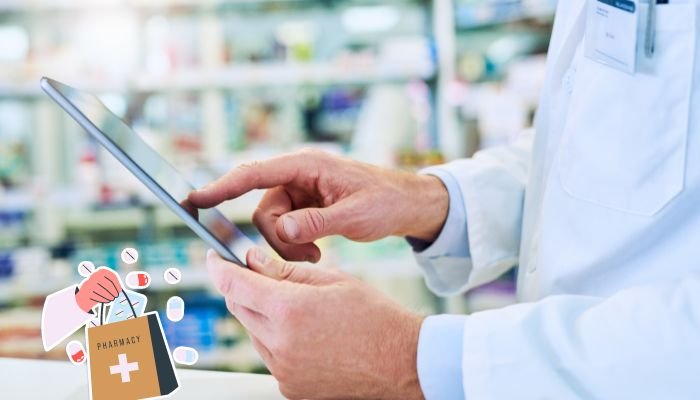What Exactly is Diploma in Pharmacy?

Vocational Diploma in Pharmacy ORD(Page 160)Description of the courseThis is a diploma course programme of education that prepares individuals eor pharmacy practicp an to give them knowledge related medicines. It tends to take two or three years and gives the students groundwork, teaching them the basics for a pharmacist pharmacy tech or partnering with pharmacists.
Diploma in pharmacy involves the study of basic concepts and knowledge needed to perform an effective role as part of a healthcare team. • Students take courses in pharmacology, pharmaceutical chemistry, pharmaceutics pharmacognosy,pharmaceutical jurisprudence and pharmacy practice along with relevant sub-specialties throughout their Diploma program in Pharmacy. They learn about drug classification, dosage forms, drug interactions, compounding methods; and medication dispensing controls and pharmaceutical mathematics.
These programs may also conduct training in a pharmacy store for exposure to practical and hands-on scenarios of handling medicine, managing inventory and answering problems from the patients among other duties helping pharmacists.
After completing the Diploma in Pharmacy programme, graduates may pursue entry-level jobs at community pharmacies, hospitals, pharmaceutical industries as well as other health care settings. They facilitate routine mattters for pharmacies, such as inpatient counseling and the documentation of inventory.Categorized seperetly from a registered pharmacist
A pharmacy degree, however can also be your first step to further training and career advancement in a related field — like chemistry counterpart or biochemistry. To wrap it up, a Diploma in Pharmacy is the perfect launchpad for a job in the lucrative pharmaceutical sector or an add-on certificate to make patients feel better about their health conditions and overall well being.
Pharmaceutical Industry Roles

Career opportunities in Diploma in Pharmacy
From the sphere of medicine, a career oriented course, diploma in pharmacy creates incredible and determined graduates who can work vigorously to service pharmacies in pharmaceutical as well as healthcare circles. PharmD program graduates are well-prepared for a wide range of pharmacy practice and related positions.
Pharmacy Technician
Interestingly, one of the most common career paths that Diploma graduates Is a Pharmacy technician. Pharmacy technicians aid pharmacists in preparing and dispensing medications; compounding prescriptions; maintaining inventories and records, as well as providing customer service to patients. They have an essential function in enabling and helping pharmacies to work efficiently whether or not they are component of a neighborhood pharmacy chain of therapeutic facility.
Hospital Pharmacy Assistant
May be registered with the Ontario College of Pharmacy as a pharmacy assistant. In this position, they work under the supervision of pharmacists by compounding medication in the unit and distributed medication for patients according to policies and procedures set forth from hospital pharmacy. This may also include assisting with sterile compounding and other pharmacy services.
Retail Pharmacy Assistant
In retail pharmacies chain stores, independent and Internet pharmacy company employ many diploma holders as pharmacy assistants. This may include processing customer orders for prescriptions, helping with inquiries related to over-the-counter products, restocking merchandise and assisting in managing insurance claims boundaries.
Pharmaceutical Sales Representative
Pharmaceutical Sales Representative — A few diploma holders choose a career as pharmaceutical sales representatives. Their job involves promoting and selling a variety of pharmaceutical products to their assigned group of healthcare providers, including physicians, other prescribing professionals (portion controlled clinics) and hospitals They teach heathcare providers about the product, how to use and dose it.
Pharmaceutical Industry Roles
Pharmaceutical Companies — In pharmaceutical companies, diploma holders in pharmacy are employed for various job roles. They can work in manufacturing plants or quality control labs of the industry, R&D department and Regualation affairs and Sales & marketing team. They can work in sectors such as drug production, formulation development, quality control and regulatory compliance or product marketing.
Healthcare Administration

Taking supplementary training or education, diploma holders can aspire for a career in healthcare administration with particular job at any sector that has to do with pharmacy operations and management. Pharmacy supervisors, pharmacy managers or directors: These professionals handle the nitty-gritty of what goes on within a pharmacy and make certain pharmacies adhere to all regulatory requirements (which often change yearly).
Clinical Research Assistant

Those with a diploma program in psychology who are highly interested in research might be able to find work as clinical research assistants or coordinators. This includes assisting investigators, stakeholders and research participants in the planning, implementation and management of clinical research studies while complying with all applicable policies and regulations.
Benefits of Diploma in Pharmacy: A diploma in pharmacy gives you various career options such as pharma industry, hospital administration and clinical research. From there, graduates can then pursue paths dictated by their interests, skillsets and career goals including further education or specialization opportunities.
Why Choose for a Diploma in Pharmacy
Bridge to Health Care Profession
Pursuing a Diploma in Pharmacy is the path to getting your foot into one of the most lucrative careers that anybody could get especially when it relates to healthcare. They are now educated and trained regarding the fundamentals they need to join healthcare teams directly participating in patient care and well-being.
Hands-On Learning Experience
Pharmacy diploma programs usually possess practicum sections wherein students perform actual work inside pharmacies. It is a way of learning where students are given the opportunity to apply theoretical knowledge in real-life situations, developing their skills and becoming prepared for professional work.
High Demand and Job Security
The global demand for pharmacy professionals is enormous; population increases and aging demographics, along with healthcare expansion are driving the trend. Hence job market and employment outlook are safe for diploma holders of pharmacy programs which also offer career progression possiblities to gradautes as well.
Contribution to Public Health
Pharmacists lead the way in ensuring that medications are used safely and effectively to help save lives. Diploma in Pharmacy can also have a good effect on public health, For any low and middle resource countries like us we need to maintain our power i.e urge our young ones to give examination of D. Pharm from these pharmacy colleges as results would be huge.
Global Recognition and Mobility
Pharmacy is a globally recognized profession, which means that qualifications obtained through Diploma in Pharmacy programs are valued internationally. This recognition provides graduates with opportunities for employment and career advancement not only in their home country but also in other countries around the world.
Professional Prestige and Respect
Pharmacists are highly respected members of the healthcare community, trusted by patients, healthcare professionals, and the general public. By becoming a pharmacy professional through a Diploma in Pharmacy program, individuals gain a sense of professional prestige and respect that comes with being part of a noble profession dedicated to helping others.
Opportunity for Lifelong Learning and Growth
Finally, opting for a Diploma in Pharmacy offers individuals the opportunity for lifelong learning and personal growth. Whether through continuing education, professional development activities, or hands-on experience in diverse pharmacy settings, graduates have the chance to continuously expand their knowledge, skills, and expertise throughout their careers.








